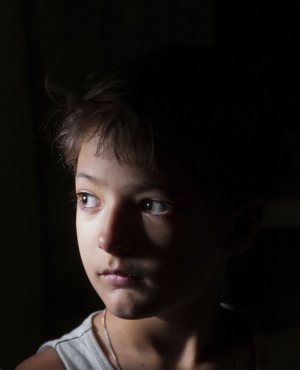Initiative Brings Cross-Discipline Leaders Together to Discuss New Children’s Data Network at USC
March 27, 2014 / by Charli Engelhorn- Research
A ground-breaking two-day event at the University of Southern California’s School of Social Work brought together researchers, policymakers, agency leaders, philanthropic funders and community partners to discuss a new data network focused on linking information concerning children’s services.
The “Advancing Science of Children’s Services Through Large Data” conference was organized by Jacquelyn McCroskey, the John Milner Professor of Child Welfare, and Assistant Professor Emily Putnam-Hornstein in collaboration with the school’s Child Development and Children’s Services cluster and First 5 LA, a Los Angeles-based organization dedicated to promoting the emotional and physical health and success of area children during the first five years of life.
The convening was held as a kick-off for the Children’s Data Network (CDN), a data and research collaborative funded through a grant from First 5 LA to link administrative data and generate research that informs children’s policies and programs. Attendees explored the scientific potential of administrative data for research and evaluation purposes and models for successful university-agency-community data partnerships.
“One of our goals was to bring people together,” said Putnam-Hornstein. “The CDN is not just about researchers in an academic setting crunching numbers. We want it to be a collaborative project where the work that emerges is actionable and relevant.”
More than 100 people participated, including representatives from Los Angeles County and state-level departments, foundations with an interest in children’s health and well-being, national and international researchers, and key Los Angeles-based partner organizations. Twenty presenters discussed topics pertaining to record linkage for research and evaluation; data partnerships between government, university and community stakeholders; how to use data to comprehensively understand the larger scope of a child’s physical and emotional wellness; and the mechanisms for obtaining and structuring integrated data.
“It is exceptionally rare to bring together the most prominent thought leaders in child welfare for the exchange of ideas about future data development, issues in large administrative database use and other related questions,” said Dean Marilyn Flynn. “It changes and advances the dialogue on how we can better understand and create relevant policies addressing children’s needs.”
A number of noteworthy professionals in the field presented, including Dennis Culhane, professor of social policy at the University of Pennsylvania, who discussed the distinction between applications for integrated data, and Rebecca Glauert, who manages the Western Australian Developmental Pathways Project, the largest cross jurisdictional data linkage project in Australia. Glauert shared her experiences with integrated data systems, relaying the importance of organizational partnerships and community involvement, and how data can be used to support informed policy decision-making and generate new knowledge.
“The data network [CDN], itself, is focused on analyses specific to L.A., but we are establishing partnerships both locally and at the state level as a way to connect people and generate knowledge that can be leveraged statewide,” said McCroskey. “There are a number of interesting researchers doing work that can help us frame our goals, and the convening brought them together with key agency members, who were able to get an idea of how the network works.”
Denise Herz, a professor and director of the School of Criminal Justice and Criminalistics at California State University, Los Angeles, gave a presentation about making meaning of data. Herz reminded the participants about the families and children existing behind the data, suggesting that administrative data can help uncover the “who, what, where and when,” but additional sources, possibly from other partnering agencies, are often required to determine the underlying “why,” or the meaning, of the data.
Putnam-Hornstein said the attendance and feedback to the event was incredible, feeling fortunate to have had so many terrific speakers and attendees make the time to be part of the conference.
“We viewed the convening as an opportunity to get people excited about the potential of the network,” said Putnam-Hornstein. “Rather than just telling them what the CDN planned to do, we thought it was better to showcase the work being done in other jurisdictions and highlight the possible knowledge that can be generated when you link data.”
Flynn said the CDN is a breakthrough in the field of social work in that for the first time, data from state-level and county-level sources can be linked to permit child welfare professionals and stakeholders to understand the full progression of life experiences and events affecting child development.
“The CDN is significant partly for its inclusion of other scholars and for its vision of how child welfare research can be conducted in the future,” said Flynn. “It expands greatly the way in which social work research might legitimately be developed and taught in graduate schools, defines new roles for county/university relationships, and promises to promote real change in the way interventions for children are conceptualized, supporting a much stronger cross-sector focus.”
Although the CDN has launched, McCroskey and Putnam-Hornstein know the real work is just beginning. Discovering the benefits of large-scale “big” datasets for scientific evaluation and learning how to best partner toward the betterment of children’s services will be a work in progress.
“I think it was a really good thing that we did [the convening] at the beginning,” said McCroskey. “This is a great opportunity, but we can’t do it ourselves, so we are looking for people to help us. We are not at the stage to provide specific plans but, rather, inform our planning with what works in other places and build on what we know.”
To reference the work of our faculty online, we ask that you directly quote their work where possible and attribute it to "FACULTY NAME, a professor in the USC Suzanne Dworak-Peck School of Social Work” (LINK: https://dworakpeck.usc.edu)
